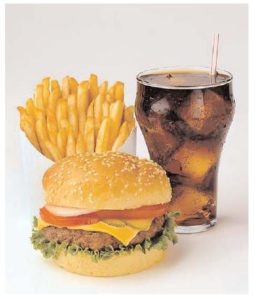 Once again, bad news about ultra-processed foods. American adults eat so much ultra-processed food that it's now about 57% of their daily calories. It's because these foods are convenient, durable, available everywhere, taste good, and frequently are less expensive than whole foods.
Once again, bad news about ultra-processed foods. American adults eat so much ultra-processed food that it's now about 57% of their daily calories. It's because these foods are convenient, durable, available everywhere, taste good, and frequently are less expensive than whole foods.
A large study found that eating lots of ultra-processed foods (e.g., prepackaged foods, fast foods) is associated with a higher risk of colon cancer in men. Specifically, a 29% higher risk when compared to men who ate the least ultra-processed foods.
This association was not found in women.
However, when the researchers looked at specific kinds or categories of ultra-processed foods that were eaten, they found differences in colorectal cancer risk. Higher consumption of meat/poultry/seafood based ready-to-eat-products and sugar sweetened beverages (soda!) was associated with a higher colorectal cancer risk in men. Higher consumption of ready-to-eat/heat mixed dishes was associated with colorectal cancer in women.
But interestingly, eating yogurt and dairy based desserts were negatively associated with colorectal cancer risk in women - it's as if they were protective. Perhaps the beneficial microbes in the dairy foods?
Ultra-processed foods are ready-to-eat or ready-to-heat foods made of little or no whole foods. Instead, they are mostly made of substances derived from foods. They typically have many added ingredients such as additives, artificial colors, preservatives, stabilizers, sugars, artificial sweeteners, salt, flavorings, and hydrogenated fats.
Examples are frozen meals, soft drinks, hot dogs, cold cuts, fast food, packaged foods (including cookies and cake), candies, instant soups, and sweet or savory packaged snacks.
Studies also show that ultra-processed foods cause negative or harmful changes in the gut microbiome (microbial community of bacteria, viruses, fungi). Higher consumption is associated with a higher risk of a number of chronic diseases and cancer.
From Science Daily - New study links ultra-processed foods and colorectal cancer in men
For many Americans, the convenience of pre-cooked and instant meals may make it easy to overlook the less-than-ideal nutritional information, but a team led by researchers at Tufts University and Harvard University hope that will change after recently discovering a link between the high consumption of ultra-processed foods and an increased risk of colorectal cancer.
In a study published Aug. 31 in The BMJ, researchers found that men who consumed high rates of ultra-processed foods were at 29% higher risk for developing colorectal cancer -- the third most diagnosed cancer in the United States -- than men who consumed much smaller amounts. They did not find the same association in women.
The study analyzed responses from over 200,000 participants -- 159,907 women and 46,341 men -- across three large prospective studies which assessed dietary intake and were conducted over more than 25 years. Each participant was provided with a food frequency questionnaire every four years and asked about the frequency of consumption of roughly 130 foods.
For the study in BMJ, participants' intake of ultra-processed foods was then classified into quintiles, ranging in value from the lowest consumption to the highest. Those in the highest quintile were identified as being the most at risk for developing colorectal cancer. Although there was a clear link identified for men, particularly in cases of colorectal cancer in the distal colon, the study did not find an overall increased risk for women who consumed higher amounts of ultra-processed foods.
The analyses revealed differences in the ways that men and women consume ultra-processed foods and the prospective associated cancer risk. Out of the 206,000 participants followed for more than 25 years, the research team documented 1,294 cases of colorectal cancer among men, and 1,922 cases among women.
The team found the strongest association between colorectal cancer and ultra-processed foods among men come from the meat, poultry, or fish-based, ready-to-eat products. "These products include some processed meats like sausages, bacon, ham, and fish cakes. This is consistent with our hypothesis," Wang said.
The team also found higher consumption of sugar-sweetened beverages, like soda, fruit-based beverages, and sugary milk-based beverages, is associated with an increased risk of colorectal cancer in men.
However, not all ultra-processed foods are equally harmful with regard to colorectal cancer risk. "We found an inverse association between ultra-processed dairy foods like yogurt and colorectal cancer risk among women," said co-senior author Fang Fang Zhang, a cancer epidemiologist and interim chair of the Division of Nutrition Epidemiology and Data Science at the Friedman School.
Overall, there was not a link between ultra-processed food consumption and colorectal cancer risk among women. It's possible that the composition of the ultra-processed foods consumed by women could be different than that from men. "Foods like yogurt can potentially counteract the harmful impacts of other types of ultra-processed foods in women," Zhang said.
The potential role of food additives in altering gut microbiota, promoting inflammation, and contaminants formed during food processing or migrated from food packaging may all promote cancer development, Zhang noted.
